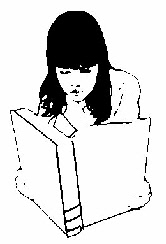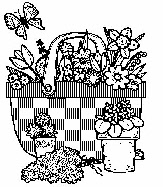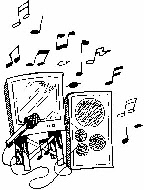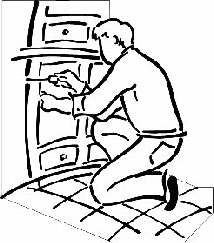

Make a point of visiting us weekly!

Return to Becoming a Learner CONTENTS PAGE
Page 9: The Environment for Learning
There will be some of you who turn to this page and wonder why I’ve even bothered to write it. It’s a bit obvious, you might think, but actually it is the obvious things we don’t think about and I really believe some real thought in this area can help a lot in the learning process, so here it is....
Part 2: The Adventure of Learning
The Need to think about a Learning Environment
If you are a pupil still at school, or a full-time student at College, then learning is a big, ongoing part of your life and somewhere at home you store your books and do your work. If you are at Uni you’ll no doubt either use libraries or your own room with a desk. Those in full-time learning take these things for granted. You need somewhere to store books, folders, papers, your computer or iPad.
But more than that, psychologically, most of us embarking on a period of learning such as a course, need to strengthen our resolve to learn by creating a supportive environment (space) that makes us ‘feel’ like a learner, that makes us feel like we are truly embarking seriously on this path, and this is no more true than for the adult who starts out on a learning course from home.
If you are launching out on an adult learning course, it may be sometime since you’ve done any regular learning and you need to remind yourself of these requirements. Now the biggest issue here is KNOW YOURSELF because different people prefer different environments.
Some people will read or listen to tapes, CDs etc or even use their laptop or iPad while on a bus or train or plane. They may even do most of their writing using a pad or a laptop or an iPad in any one of those situations. They probably aren’t the majority of us.
To clarify what we are thinking about, can I categorise our learning as either ‘intellectual’ or ‘practical’. There will, no doubt, be those who will argue with those distinctions but I make them for a very obvious reason.
What I am calling intellectual is the handling of knowledge that will remain in your mind, on paper or on your computer/iPad etc. Storage or work space will be determined by whether you are working with books, folders, papers or simply using online computing materials.
What I am calling ‘practical’ is learning that will involve your hands and has a practical outworking. This may be done on college premises but you may also have to do some at home. If you are teaching yourself from books or the Internet, then all of your work is going to be at home. Easy examples of this would be woodworking, wood-turning, jewellery making, cooking, knitting, growing Bonsai trees, painting or sculpting, pottery making etc. etc.
If you are a pupil still at school, or a full-
But more than that, psychologically, most of us embarking on a period of learning such as a course, need to strengthen our resolve to learn by creating a supportive environment (space) that makes us ‘feel’ like a learner, that makes us feel like we are truly embarking seriously on this path, and this is no more true than for the adult who starts out on a learning course from home.
If you are launching out on an adult learning course, it may be sometime since you’ve done any regular learning and you need to remind yourself of these requirements. Now the biggest issue here is KNOW YOURSELF because different people prefer different environments.
Some people will read or listen to tapes, CDs etc or even use their laptop or iPad while on a bus or train or plane. They may even do most of their writing using a pad or a laptop or an iPad in any one of those situations. They probably aren’t the majority of us.
To clarify what we are thinking about, can I categorise our learning as either ‘intellectual’ or ‘practical’. There will, no doubt, be those who will argue with those distinctions but I make them for a very obvious reason.
What I am calling intellectual is the handling of knowledge that will remain in your mind, on paper or on your computer/iPad etc. Storage or work space will be determined by whether you are working with books, folders, papers or simply using online computing materials.
What I am calling ‘practical’ is learning that will involve your hands and has a practical outworking. This may be done on college premises but you may also have to do some at home. If you are teaching yourself from books or the Internet, then all of your work is going to be at home. Easy examples of this would be woodworking, wood-
Obviously some things you may take up, you are not going to do at home, for example ballroom dancing, ice skating, archery, hang-gliding, flying, fishing, sailing and so on. If you are taking up these things, this page is not for you! The rest of this page is for those of us who are likely to be working at home.


Noise or No-Noise
Although thinking about a noisy background applies mainly to intellectual learning, it may also include the practical or physical learning as well. Nevertheless, when it comes to doing work away from the classroom or lecture hall, we tend to fall into two groups – and I’ve never been sure why we fall into our respective groups.
Group 1 likes a quiet environment. No, we do not want the TV on in the background, and no, we’d prefer there weren’t people chatting in the background and no, we don’t want music playing in the background either, whether it be earphones, the radio, high-fi or even the computer itself or iPad.
Group 2 doesn’t mind any of these things that Group 1 call distractions; in fact Group 2 work better with background noise. They view it as either ‘white sound’ that blanks out everything else, or they find their mind and emotions are stimulated by it!
Thus for a conclusion, we revert back to our ‘big issue’ – KNOW YOURSELF.
Although thinking about a noisy background applies mainly to intellectual learning, it may also include the practical or physical learning as well. Nevertheless, when it comes to doing work away from the classroom or lecture hall, we tend to fall into two groups – and I’ve never been sure why we fall into our respective groups.
Group 1 likes a quiet environment. No, we do not want the TV on in the background, and no, we’d prefer there weren’t people chatting in the background and no, we don’t want music playing in the background either, whether it be earphones, the radio, high-
Group 2 doesn’t mind any of these things that Group 1 call distractions; in fact Group 2 work better with background noise. They view it as either ‘white sound’ that blanks out everything else, or they find their mind and emotions are stimulated by it!
Thus for a conclusion, we revert back to our ‘big issue’ – KNOW YOURSELF.

Storage
This may seem somewhat mundane but if you are starting up the learning process after a period away from learning, it may be something you are going to have to think about – especially if your learning is something practical.
This may seem somewhat mundane but if you are starting up the learning process after a period away from learning, it may be something you are going to have to think about – especially if your learning is something practical.
If you are going to take up painting, for instance, you’ll not only want somewhere to store your easel and your materials, you’re also going to have to think where can you set it up to do work at home unhindered. If you live on your own, there’s no problem. If you have a partner and children, then you want somewhere where your precious work is not going to be harmed by the crowd – drawn on by the toddler and knocked over by the teenager in a rush!
This probably applies to any ‘practical’ learning, learning that has a physical dimension to it. Suppose you decide to take up Bonsai, then you are going to have to have somewhere where you can both work on and store your miniature trees. If you decide to take up making jewellery, or anything else for that matter, you need both work space and storage space. Think about these things before you get under way. You may need to build some storage space!
This probably applies to any ‘practical’ learning, learning that has a physical dimension to it. Suppose you decide to take up Bonsai, then you are going to have to have somewhere where you can both work on and store your miniature trees. If you decide to take up making jewellery, or anything else for that matter, you need both work space and storage space. Think about these things before you get under way. You may need to build some storage space!

Clutter or Clearance
Again this is going to sound so obvious that you may wonder about it, but I have watched people working and not been surprised when they spend half their life scrabbling around for a sheet or paper with an article on, or an essential magazine, or whatever it is they have lost.
There are two problems about having your work area strewn with papers, magazines and books. The first one is that within this disaster area there is likely to be an immense amount of redundant material. It’s now just there acting as clutter to hide what you need. The other one is that having stuff all over the place means you have no order in the things that are going to be useful.
Again this is going to sound so obvious that you may wonder about it, but I have watched people working and not been surprised when they spend half their life scrabbling around for a sheet or paper with an article on, or an essential magazine, or whatever it is they have lost.
There are two problems about having your work area strewn with papers, magazines and books. The first one is that within this disaster area there is likely to be an immense amount of redundant material. It’s now just there acting as clutter to hide what you need. The other one is that having stuff all over the place means you have no order in the things that are going to be useful.

When i look around my office, i realise I am a half-guilty clutter merchant. My central working area is clear but around the wider perimeter of the room it starts to disintegrate. You know you need help when you answer ‘No’ to the following two questions:
1. Do I know what everything is in the area around me?
2. Can I lay my hands quickly on things I need for this current project?
2. Can I lay my hands quickly on things I need for this current project?
Beware the curse of future clutter. Future clutter? Yes, because if you are starting out on a new practical learning project – painting, pottery, jewellery making etc. – and you are successful, then you are
a) Going to save everything you make, and
b) Want more and more materials to expand what you do.
b) Want more and more materials to expand what you do.
Success means a measure of order at least. Plan for success, plan for increased storage, you know it makes sense!
Light-hearted or Serious Minded
There are some things that impose themselves on us and create a sense of heaviness or seriousness upon us – the need to qualify, the need to borrow money to finance my learning and then later pay it back, and expectations of other people. These sort of things create a heaviness in learning and can lurk there in the background like a little black cloud spoiling the potential of what is going on – your learning process.
Creativity – and learning should always have a creative element in it – flows best in the absence of stress, worry and anxiety. Here is a bizarre suggestion – and it has been in the background of everything we’ve said in all these pages – ENJOY YOUR LEARNING!
This page is continued on Page 8A
There are some things that impose themselves on us and create a sense of heaviness or seriousness upon us – the need to qualify, the need to borrow money to finance my learning and then later pay it back, and expectations of other people. These sort of things create a heaviness in learning and can lurk there in the background like a little black cloud spoiling the potential of what is going on – your learning process.
Creativity – and learning should always have a creative element in it – flows best in the absence of stress, worry and anxiety. Here is a bizarre suggestion – and it has been in the background of everything we’ve said in all these pages – ENJOY YOUR LEARNING!
This page is continued on Page 8A
